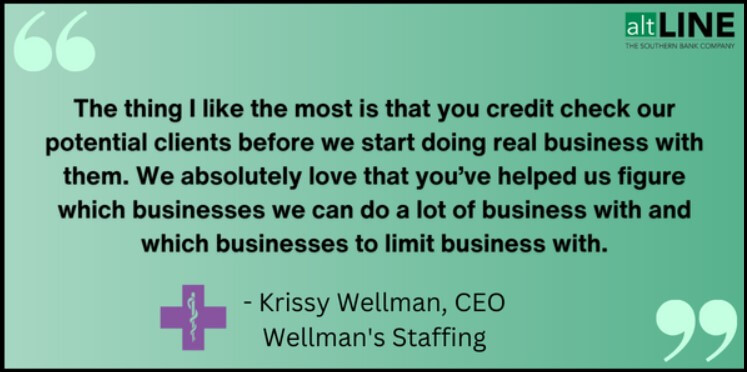Types of Financing for Staffing Agencies
Last Updated May 28, 2024
Running a successful staffing company can be rewarding, but you have to first get financing for your staffing agency to get your new venture off the ground. There are plenty of financing options available, but it can be intimidating to decide which solution best fits your business. In this article, we’ll address key points related to financing for staffing companies, including:
- Staffing industry trends
- Types of financing for staffing companies
- Common reasons a staffing company needs to revisit its financing strategy
Growth Across the Staffing Industry
Companies across the globe are outsourcing job functions at record levels.
According to a recent report from Technavio, “The recruitment process outsourcing (RPO) market share is expected to increase by $4.55 billion from 2020 by the end of 2025, and the market’s growth momentum will accelerate at a CAGR of 13.51%.” Decreases in operational costs are largely driving the growth in the RPO market as outsourcing has led to lower costs per hire.
Further support of growth across the staffing industry comes from Staffing Industry Analysts (SIA). SIA compiled comprehensive data on measuring the gig economy to capture the growing number of people and expanding payroll represented by the US contingent workforce.
According to SIA, “an estimated 44 million people took on gig work in the US in 2015 with 29% of all US workers performing gig/contingent work last year. Total spending on gig work in the US was $792 billon.”
These numbers present a promising story for staffing companies. More businesses are turning to contingent or temporary agencies for workforce solutions. A growing number of businesses appreciate the skills, knowledge, and flexibility of the contingent workforce. Staffing companies well-positioned to leverage this trend can benefit from the immense growth opportunities.
Why Is Financing for Staffing Companies Important?
There are a variety of reasons why new, growing, and mature staffing agencies may need access to funding. Below are some of the top reasons we see as a provider of payroll funding for staffing companies.
Staffing Companies Need Capital to Keep Up
Growth-oriented staffing agencies (or even those looking to start a staffing company) require capital to take advantage of the current industry trends. Whether a staffing firm plans to bid for new contracts or seeks areas to invest in for competitive advantages (such as training, marketing, or technology improvements), the company needs a dependable source of financing. A partnership with a reputable and reliable financing partner sets the foundation for funding growth opportunities.
Payroll Funding for New Contracts
When a new contract comes in, expenses immediately follow. Most notably, payroll expenses for a staffing firm’s contingent workforce begin right away. The staffing company places workers at the job site and typically starts paying those employees weekly or biweekly. The staffing company fronts the payroll expense until the client receives and pays the invoice.
This lag in time may equate to as long as 30-60 days and causes cash flow problems for many businesses, particularly staffing companies. In this case, additional capital helps to ‘solve the cash flow crunch’ or ‘bridge the gap.’ This type of financing used by staffing companies is known as payroll funding or payroll financing.
Related: How Nursing Staffing Agencies Can Get Contracts
Investment in Competitive Advantages
Staffing companies face stiff competition, and investment in competitive advantages can position an agency for growth. Some staffing companies utilize advanced training or specialized programming to enhance the skills of temporary employees.
For example, temporary agencies placing light industrial workers may see training related to hand-eye coordination, equipment operation, and stack-and-sort job functions as a worthwhile investment. For administrative and clerical temporary positions, education around new organizational productivity techniques or software training may provide a competitive edge for a staffing company.
Types of Staffing Company Financing
Standard business loans for staffing agencies aren’t always the optimal source of financing for your employment agency.
Below, we evaluate not only traditional business loans for staffing agencies, but also independent funding companies, payroll funding companies, and specialized staffing lenders.
Traditional Bank Financing
A large bank is typically a staffing company’s first stop for financing. Established staffing companies have an existing relationship with their banking partner, so it’s a natural starting point to look for staffing agency loans.
While a bank loan or line of credit offers preferred terms and reputational benefits, many traditional banks turn away staffing companies due to a lack of hard assets. Most banks view staffing businesses as beyond their ‘credit box’ or the tightly defined parameters for assessing the risk associated with a borrower. Some staffing companies may be eligible for traditional bank financing, but even then, tight limitations exist which we’ll address in a later section.
Independent Financing Companies
Independent financing companies offer highly creative and flexible commercial lending options. These companies do not operate under the same rules and regulations as banks and financial institutions, so they can be more lenient in who they’ll do business with and the types of deal structures.
Since independent finance companies work with all types of businesses across all sectors, they lack specialization in any particular industry. Only a financing partner with a specialty in the staffing industry understands the unique challenges of a staffing business.
Also, independent finance companies borrow money from another source to lend to businesses, including staffing companies. These funds incur additional costs, so they are more expensive for staffing companies than direct sources of funds.
Payroll Funding Companies
Payroll funding, which is essentially invoice factoring for staffing companies, presents another avenue for a staffing company to access capital.
Payroll funding companies offer broad flexibility in who they’ll work with in terms of size and performance level of the company. With a payroll funding agreement, you are able to sell your unpaid invoices to the lender in exchange for a cash advance that you can use to cover payroll and other operating expenses. However, a staffing company will pay a premium on the cost of capital when working with a payroll funding provider.
Bundled Payroll Funding Services
More traditional payroll funding companies often bundle multiple payroll services together, so it can become difficult to know the price of the payroll funding service independent of the other services. Bundled payroll services may include payroll processing, tax processing services, staffing software, credit and collection services, and more. A complete payroll solution appears convenient and easy, but upon further analysis the costs to the staffing company are significantly higher than if the company looks to a direct source of payroll funding, such as through a bank factor like altLINE.
Modern Payroll Funding Services
An alternative to bundled payroll services are payroll funding companies that specialize in financing for staffing companies but do not bundle payroll funding with other required add-on services. This type of financing is what we offer here at altLINE. By working with a payroll funding provider that does not bundle payroll services, you get to partner with a lender that is familiar with the staffing industry and understands the areas of your business that can cause financial challenges but does not require you to pay extra for services that you do not want or need.
Most Common Reasons Staffing Companies Finance with altLINE
altLINE offers payroll funding for staffing companies, serving an impressive roster of growth-oriented staffing companies nationwide. And with each new staffing client who comes aboard, we seek to understand their motivation. The same top reasons frequently come up when a new staffing client answers the question, “What circumstances led you to look to us for your financing needs?”. Below are some of those reasons.

Startup Staffing Company Needing a Cash Infusion
Launching a startup staffing company requires a sizable initial investment. At a minimum, the upcoming company needs capital for office space rent, technology needs and payroll. Traditional bank financing requires two years of operating history. Between the lack of operating history and lack of assets, a traditional bank simply can’t offer funding to a startup staffing company.
While we are a bank, we are much better equipped to handle and ready to take on financing relationships with startup staffing companies. Our staffing division offers an array of borrowing options for startups seeking to take advantage of borrowing against their accounts receivable.
Line of Credit Capped with Primary Banking Partner
Some staffing companies do qualify for traditional bank financing. With at least two years of operating history and solid profitability, a bank may offer a line of credit to a staffing company if the business owner pledges personal collateral. This arrangement may last for some time, however often the staffing company outgrows the line, and their borrowing ability is capped. In these cases, when the staffing company goes back to the bank for a line increase, they will often be denied.
Many of our clients have experienced this scenario with their primary banking relationship. Their line of credit is capped and their bank can’t lend anything further. We can work in tandem with your primary banking partner, but our aim is not to take over your primary banking relationship. Our business model solely addresses the financing piece for staffing companies.
Need Financing While Avoiding Violating a Loan Covenant
Some staffing companies with traditional bank financing products may operate under covenants. A loan covenant is a condition that requires the borrower to fulfill certain conditions or which forbids the borrower from undertaking certain actions. Typically, violation of a covenant may result in a default on the loan being declared, penalties being applied, or the loan being called.
In a move to avoid tripping a covenant, staffing companies often look to altLINE for access to capital. Utilizing accounts receivable to fund growth doesn’t require incurring additional debt which is often a restrictive financial covenant in play.
Choosing the Right Payroll Financing Partner
Finding a financing partner who specializes in your industry, can grow with you, and offers competitive rates and services will make a big difference in your future. Many deal structures and financing facilities exist. Be sure to find a partner you who can answer your questions with direct answers. An industry resource, Payrollfunding.com, assembled a list of questions to ask for finding the best provider.
If you’d like to learn more about how altLINE can help your staffing agency, give us a call at +1 (205) 607-0811 or fill out our quote form. Not ready to speak with one of our sales representatives? Check out some of our customer testimonials to see how altLINE helped them grow:



